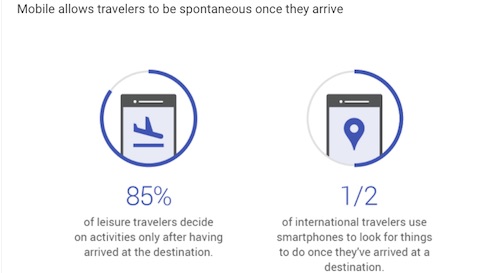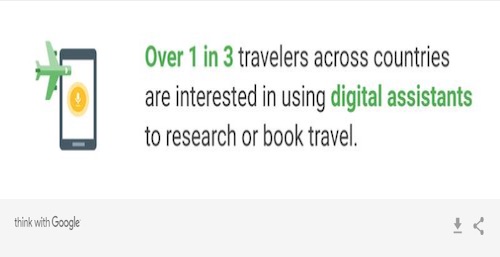
Planes, trains and auto-fill: The future of holiday buying is faster, smarter and simpler
By cameron in Uncategorized
This is a viewpoint from Sébastien Pichon, industry manager, travel, at Google UK.
When it comes to travel, customers have become an impatient bunch. People enjoy a reasonable amount of leisure time, comparatively high disposable income and raging FOMO – the fear of missing out on the latest restaurant or destination hostspot.
And now they have the right tool to allow them to act spontaneously from anywhere; smartphones allow everyone to research and take advantage of last minute offers, deals, and travel promotions.
A recent study from Google and Phocuswright found 60% of US travellers would consider an impulse trip if they could grab a good hotel or flight deal. In fact, travel-related searches for ‘today’ and ‘tonight’ on mobile have increased by 150% in the last two years.
To capitalise on changing consumer behaviours, travel brands need to prioritise their search strategies, so they can meet the customer’s needs in those moments that matter for leisure hunters – be they beach-lovers or fans of city breaks.
Businesses need to have the right content and recommendations immediately available and to develop a frictionless user experience for visitors to their site if they want to enjoy conversions, great word of mouth and repeat bookings.
The power of mobile
Smartphones have now been a feature of our lives for a decade. In this time, they have completely transformed the way people behave and the way they travel; becoming the tool of choice for all consumer search needs.
According to our research with Ipsos in 2016, 36% of smartphone users turn to their phones for travel-related activity and 67% use mobile sites over apps, proving that when the travel bug hits, consumers want answers immediately.
However, it’s not enough just to be present. The rise in mobile has paralleled a rise in expectations: mobile pages must be both fast-loading and high quality if users are to continue without giving up.
More than half (53%) of mobile site visits are abandoned if pages take longer than three seconds to load, but the average load time for mobile sites is a massive 8.9 seconds in the UK. For travel brands, this could mean the difference between engaging and converting a customer or losing them to a ompetitor.
Travel businesses need to develop a fast and seamless user experience on mobile devices. Here are four steps that can act as a framework, based on the easy to remember mantra: Show up, Wise up and Speed Up!

think with Google insights
#1: Show up
Be as easily discoverable on mobile as on desktop – and when customers get there, ensure you are providing what they are looking for and it is easily found on the site.
#2: Wise up
Be safe: move to HTTPS. This is the secure version of HTTP, and it means that all communications between the consumer and the website are encrypted. Not using HTTPS opens users up to intruders – and the last thing most consumers want is for possible hackers and ‘bad actors’ to be aware of their holiday plans.
#3: Speed up
Be fast: Loading time under three seconds. From July, mobile speed will be a factor in a website’s mobile search ranking – so getting your mobile site up to speed is now more important than ever.
Another key to speed in the traveler’s experience is checkout. Offer a seamless checkout experience with lots of choice. It sounds obvious – but if checking out is too difficult, you’re going to lose a lot of customers along the way.

Time to get vocal
In the fast-moving world of tech, mobile speed is just one element that travel brands need to act on to meet consumer expectations. The next frontier for travel is tailoring your offering to voice search.
Advances in voice technologies and changing consumer behaviour means that we have entered the age of assistance. Google’s research tells us that 45% of people think voice is the future of search – but already there are high expectations of the interaction.
Almost 70% of requests to the Google Assistant are expressed in natural language, for instance “How hot is it in Menorca in August?” This means your site needs the capability to answer questions that are posed in the way real people talk.
For travel brand marketers, the strategy is clear: digital assistance is the new battleground for growth. Every brand will sooner or later have to become more assistive across the entire customer experience.
Ultimately, it’s all about removing the barriers, physical and procedural, to creating an amazing customer booking experience that will bring them back to rebook and enhance their lifetime value to your business.
This is a viewpoint from Sébastien Pichon, industry manager, travel, at Google UK.
Related reading:
6 stats from Google Travel’s latest missive on helping travelers in the ‘age of assistance’
Voice already making an impact on search says Google
Photo by Derick Anies on Unsplash.
![]()

